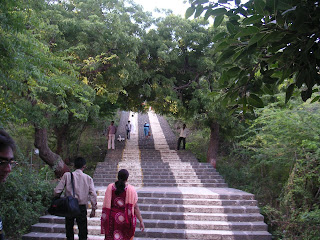



Upon returning from Mumbai, I was supposed to immediately continue to Jaisalmer together with Italian friend Dario. Unfortunately, things did not turn out exactly as planned; Dario was unable to go because of his exams and I decided to go to the far less visited town of Bikaner, in the Rajasthani desert, instead.
Things started off really well – for the first time since I started travelling in India, the sleeper bus was easy to find and (now, brace yourself) left on time! Stunned by this fact, I was completely taken by surprise by what came next. For the first time since like 1992, I became bus sick and seriously so. Not a super feeling when you know the bus ride is a 14-hour one and you are all alone, but the bus driver was a very nice man, who let me sit up front and look out through the windscreen for many hours. I owe him multi.
Bikaner is far off and there are very few tourists, though enough so that there is still a small industry catering to their needs. Oddly enough, I contributed to a temporary Swedish invasion of Vijay’s Guesthouse, as there were a family of four and three girls from Stockholm staying there at the same time. The last three, two British girls, a Lithuanian group of four and I immediately set out on a camel safari and spent the first night in tents in the desert. Riding a camel is rather like riding a horse, though somewhat slower. Thanks to friend Emma and her riding classes I was better prepared than most people and suffered no pain the day after whatsoever.
Bikaner is a very nice city, bustling with activity. Rather small by Indian standards (our guide said about 600,000 inhabitants) it houses a most impressive fort, the ground stone of which was laid in the 16th century, and an extremely charming old city. The town seems pretty affluent and most houses are well preserved. Since so few tourists find their way there, the hassle factor is also quite low.
Another good thing about Bikaner is its closeness to Deshnok, a mere 40-minute bus ride away. Here there is only one thing of interest, but interesting it very much is. Here you find the Karni Mata Temple, or as it is more commonly known, “the rat temple”. Hundreds of holy rats have it as their home and they are everywhere and totally fearless. They run over your feet, climb your back and very much enjoy being fed. I was delighted to, of course.
After three days in Bikaner and another 14-hour bus ride (though without complications) I came back to Ahmedabad this morning, for what is my last day on the IIM campus. There are a few brave exchange souls left and we will share a nice dinner tonight. Early tomorrow morning I will fly to Delhi, where I will spend the next five days. Right now I am mostly looking forward to the Lucia celebration at the Swedish Embassy tomorrow night, to which I have been invited. I am unsure to what extent I will update the blog during this visit, but I will return to Sweden Thursday, December 16.
Pictures show: rats at Karni Mata Temple (feet are mine); Bikaner fort; old city balcony; me and my camel Kadu













